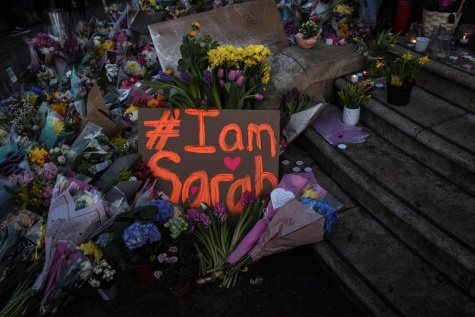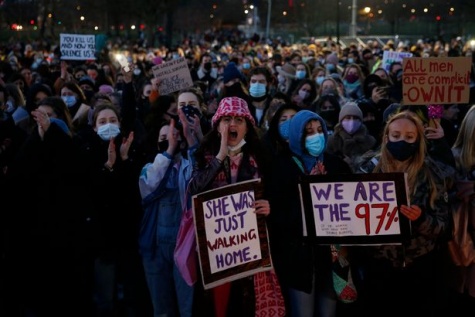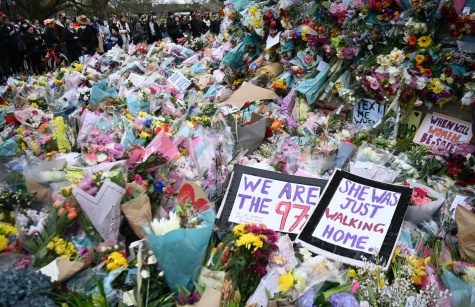
Reaghan Mulligan | Opinion Editor
March 19, 2021
You walk briskly to your car just after dark, frantically looking for anyone who might possibly harm you. Keys are gripped in one hand, acting as a shank, while your pepper spray dangles in the other, ready to inflict a painful sting. You approach your car, checking underneath. Clear. Make sure no one’s in your back seats. Empty. Lock door. Done. You breathe a sigh of relief. Tonight you are safe, but there are no promises for the future.
Better safe than sorry, right?
Sarah Everard did everything right, and more. Yet she was harmed by the one person we are meant to trust to protect us.

33 year old Everard was walking home to Brixton, in London. It was 9 PM, a reasonable hour. She wore bright clothing, checked in with her boyfriend, and even took a route that was well-lit and populated—checking every box on the “Staying Safe In Public” mental list practically every woman keeps with her.
She disappeared on the night of March 3. Her body was found a week later.
The man being charged with her kidnap and murder? Serving Met police officer Wayne Couzens. A man whose job it is to protect people from situations like this—whose purpose is to prevent crime, not cause it.
The murder of Sarah Everard has sparked a wave of emotion from women across the globe. For too many women in society, events like these hit close to home.
A vigil was organized by a group called Reclaim These Streets in order to mourn the tragic loss of Everard as well as protest against the sexist violence plaguing women in society, forcing them to sacrifice their own liberties in order to stay safe rather than holding men accountable for their own actions. The event was held in a South London park, and what first started out as a beautiful gesture of unity turned into one of heightened anger when the London police insisted that the women stay home, even attempting to enforce a lockdown.
Despite their attempts, a crowd still emerged—overcome by the feeling that instead of focusing on the perpetrators of these assaults, they were confining the women of society.
“It’s not enough for us to say the police don’t protect us. We must say loud and clear that the police are the causes, not the solution, of the racist and sexist violence we experience,” a protestor said via The New York Times.
It is time that society as a whole changes who we address when speaking on these these topics. Women know what to do. They know how to stay safe. They know that even if they do everything in their power to avoid situations like this, they too could be a victim at some point.
“It is crucial to have conversations about tragedies like this, regardless if it makes people uncomfortable,” senior Emily Schad said. “That is the exact reason why these conversations need to happen, and a lack of education about what women go through is the root of the problem.”
We must turn the conversation away from the victims of events like these. Too many warnings have been conveyed towards women to avoid x, y, or z; not enough statements have been made towards men about the way to treat and uplift women in society.
“We are expected to dress right, protect ourselves, not let anything happen to us, and yet so little energy is spent stopping men from hurting us,” senior Megan Moe said. “We need to actually have a conversation about what it is like being a woman, try and make men understand how terrifying it can be every single day, and how men can hold each other accountable.”

We tell our girls and women to dress conservatively, to take a different road, to treat dangerous situations with polite avoidance. When will we tell our men to keep their hands off women, that making light of assault is in no way a sense of humor, that catcalling or unwanted groping is no form of flattery?
“Women should not fear walking home at night. We should not fear going to a gas station at night,” junior Samantha Shaw said. “I should not be afraid to live my life just because I’m a woman.”
In this day and age, women are still giving up liberties such as taking the train home, in order to gain prolonged safety. It is not women who need to change, and we should not be targeting the victims any longer. Rather, we should address the predators. We should hold our men accountable and instruct them to change, as women have already done practically everything, to no avail, to ensure some grasp at the safety that every person should enjoy.

it’s a man vs woman agenda